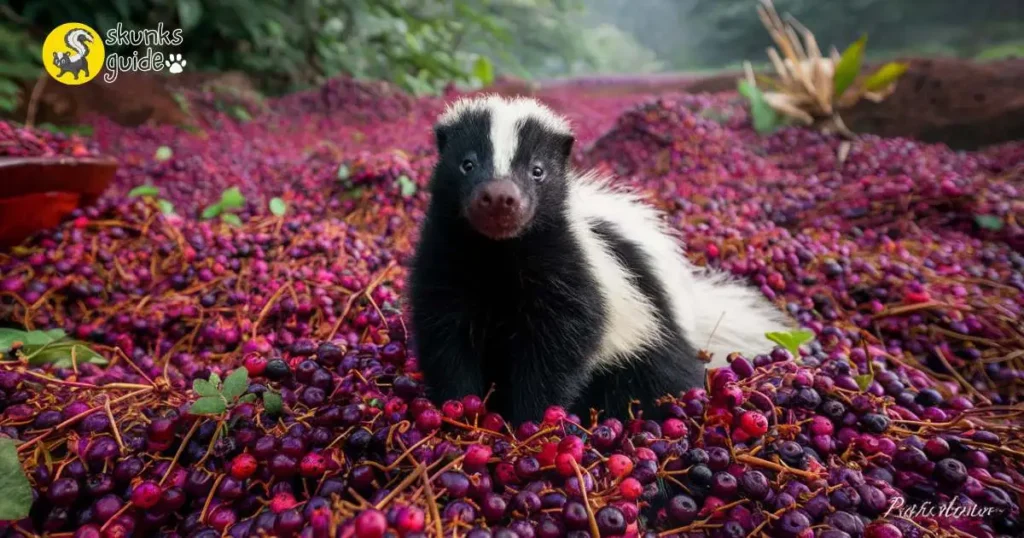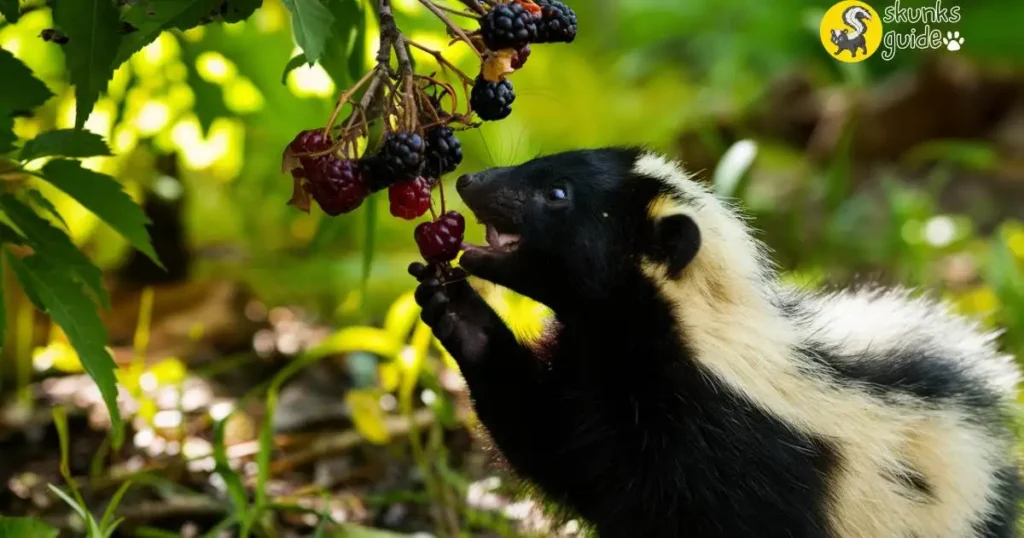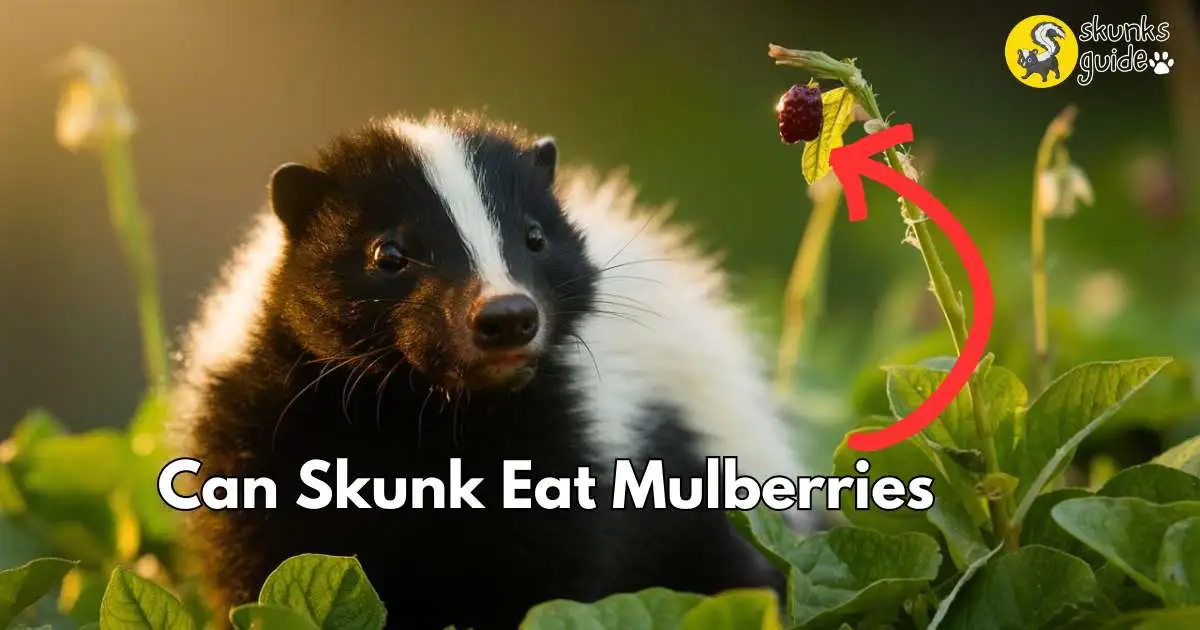Can Skunks Eat Mulberries? 6 Key Insights Revealed
Yes, skunks eat mulberries, and as someone who’s spent time caring for pet skunks and studying wildlife, I’ve seen them enjoy these juicy berries firsthand. Want to find out what makes mulberries so irresistible to skunks and learn more about their diet? Keep reading to discover more about these curious creatures.
The Mulberry Attraction
Skunks are curious creatures. They explore their surroundings for food. One fruit that catches their eye is the mulberry. This sweet and juicy fruit attracts many animals, including skunks. Let’s dive into why skunks are drawn to mulberries.
Mulberries In The Wild
Mulberries grow on trees and bushes. They thrive in various environments. Here are some key points about mulberries:
- Habitat: Mulberry trees prefer warm climates.
- Types: There are three main types of mulberries: black, red, and white.
- Nutrition: Mulberries are rich in vitamins and antioxidants.
These factors make mulberries a popular choice for many animals. Skunks enjoy foraging for food, especially in summer.
Seasonal Availability And Its Impact
Mulberries have specific seasons for growth. Understanding this helps explain skunk behavior.
| Season | Mulberry Availability | Skunk Activity |
|---|---|---|
| Spring | Flowers bloom | Low foraging |
| Summer | Fruits ripen | High foraging |
| Fall | Fruits drop | Moderate foraging |
| Winter | No fruits | Low foraging |
In summer, mulberries are plentiful. Skunks take advantage of this. They consume ripe fruits to satisfy their hunger.
Understanding the seasonal patterns helps predict skunk behavior. This knowledge can enhance wildlife observation experiences.
Skunks And Fruit Consumption
Skunks are known for their diverse diet. They often eat fruits, including mulberries. Understanding their fruit preferences helps us know more about these fascinating animals.

Preference For Fruits
Skunks enjoy a variety of fruits. Their diet includes:
- Mulberries
- Strawberries
- Raspberries
- Blackberries
- Apples
Fruits provide essential nutrients. Skunks often forage for fruits during summer. They are attracted to sweet, ripe options. Fruits are easy for them to find.
Nutritional Benefits Of Fruits For Skunks
Fruits offer many nutritional benefits for skunks. Here are the key advantages:
| Nutrient | Benefit |
|---|---|
| Vitamins | Boosts immune system health |
| Fiber | Aids in digestion |
| Antioxidants | Fights off diseases |
| Water | Keeps skunks hydrated |
Skunks benefit from eating fruits regularly. These nutrients help maintain their overall health. A balanced diet is crucial for their survival.
Mulberries: A Skunk’s Treat?
Skunks are often misunderstood creatures. They have a varied diet, and many people wonder about their food preferences. One intriguing question is whether skunks enjoy mulberries. Let’s explore this tasty topic.
The Appeal Of Mulberries To Skunks
Mulberries are sweet and juicy fruits. They grow on trees and are rich in nutrients. Skunks find them appealing for several reasons:
- Flavor: Skunks enjoy sweet flavors. Mulberries fit this perfectly.
- Easy Access: Mulberry trees often grow in backyards. This makes them easy to find.
- Nutritional Value: Mulberries provide vitamins and minerals. They help skunks stay healthy.
Skunks have a keen sense of smell. They can detect ripe mulberries from a distance. This helps them locate their favorite snacks quickly.
Observations Of Skunks Eating Mulberries
Many people have spotted skunks feasting on mulberries. Here are some interesting observations:
| Observation | Description |
|---|---|
| Time of Day | Skunks usually eat mulberries at night. |
| Eating Style | They often shake branches to drop berries. |
| Group Behavior | Skunks may eat together in small groups. |
Skunks are not picky eaters. They enjoy various fruits, including mulberries. Observers note that skunks often return to the same trees. This indicates a strong preference for mulberries.
In urban areas, skunks often raid gardens. Homeowners may find them snacking on fallen mulberries. This behavior shows how much they enjoy this fruit.
Foraging Behavior Of Skunks
Skunks are fascinating creatures. They are known for their unique foraging habits. Understanding their behavior helps us know what they eat, like mulberries. Skunks often search for food in various environments. Their adaptability makes them successful foragers.
Adaptable Foraging Strategies
Skunks use different methods to find food. They are not picky eaters. Their strategies include:
- Searching in gardens
- Foraging in fields
- Exploring urban areas
Skunks often dig in the ground. They look for insects and roots. They also climb trees to reach fruits. This includes mulberries. Their ability to adapt helps them survive.
Skunks As Opportunistic Feeders
Skunks eat whatever is available. They take advantage of seasonal foods. This includes:
- Fruits in summer
- Insects in spring
- Small mammals in fall
Mulberries are a tasty treat for skunks. They are sweet and easy to find. Skunks are also attracted to fallen fruits. This shows their opportunistic feeding nature.
In urban settings, skunks might raid garbage cans. They look for leftovers. Their flexible diet helps them thrive in various environments.
Protecting Your Mulberry Bushes
Mulberry bushes are a tasty treat for many animals. Skunks enjoy these sweet berries. Protecting your bushes helps keep your harvest safe. Here are ways to deter skunks and safeguard your mulberries.

Deterring Skunks From Gardens
Skunks can cause damage to your garden. Here are effective methods to keep them away:
- Fencing: Build a sturdy fence around your garden.
- Motion-activated lights: Bright lights scare skunks away.
- Noise makers: Use wind chimes or radios for sound.
- Repellents: Commercial repellents can deter skunks.
Safe And Humane Deterrent Methods
Using humane methods keeps skunks safe. Try these options:
- Natural repellents: Citrus peels and vinegar deter skunks.
- Plants: Grow strong-smelling herbs like mint.
- Traps: Use live traps to relocate skunks.
Remember to check local laws on trapping. Always release skunks far from your garden.
Conclusion: The Skunk-mulberry Connection
The relationship between skunks and mulberries is interesting. Skunks are opportunistic eaters. They enjoy a variety of foods, including fruits like mulberries.
Summary Of Skunks’ Dietary Habits
Skunks have a diverse diet. Here are some key points:
- Skunks eat insects, small animals, and fruits.
- They forage for food at night.
- Mulberries are sweet and nutritious.
- Skunks can help control insect populations.
Skunks are attracted to ripe mulberries. These fruits provide energy and hydration. They often visit gardens or forests where mulberries grow.
| Food Type | Examples |
|---|---|
| Fruits | Mulberries, berries, apples |
| Insects | Crickets, beetles, caterpillars |
| Small Animals | Mice, frogs, small birds |
Encouraging Natural Wildlife Diets
Supporting skunks can benefit local ecosystems. Here’s how to encourage their diets:
- Plant native fruit trees and shrubs.
- Avoid using pesticides in gardens.
- Leave some areas wild for natural foraging.
- Provide water sources like birdbaths.
By creating a friendly environment, you help skunks thrive. This connection between skunks and mulberries enriches the ecosystem.
Frequently Asked Questions
What Fruits Do Skunks Eat?
Skunks enjoy a variety of fruits. They commonly eat berries, apples, grapes, and melons. These fruits provide essential nutrients and hydration. Skunks may also forage for fallen fruit in gardens and orchards. Offering fruits can attract skunks to your yard, but ensure they are safe and fresh.
Do Raccoons Eat Mulberries?
Yes, raccoons do eat mulberries. These fruits are a tasty treat for them, especially during the summer months. Raccoons are opportunistic feeders, enjoying various fruits, including berries. Mulberries provide essential nutrients and energy for these animals. Keep an eye out for raccoons in mulberry-rich areas!
Do Skunks Like Blackberries?
Yes, skunks enjoy blackberries. These fruits provide essential nutrients and are a tasty treat for them. Skunks are omnivores and often forage for berries in the wild. Offering blackberries can attract skunks to your yard, but be cautious of their strong odor.
Conclusion
Skunks are opportunistic eaters and will enjoy mulberries when available. These fruits provide essential nutrients and a tasty treat for them. Understanding their diet helps in managing gardens and wildlife interactions. Keeping mulberries accessible can attract these creatures, benefiting your local ecosystem.

